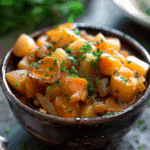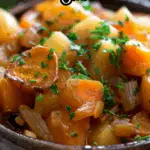Why You’ll Love Chunky Root Vegetable Stew Recipe
-
The mixture of root vegetables gives you a satisfying chunky texture and a variety of flavors — from sweet squash to earthy turnip and soft potatoes.
-
It’s nourishing and vitamin-rich: packed with vitamins A and C, fiber, and plant-based goodness.
-
Works for different dietary needs: easily made vegetarian or vegan with simple substitutions.
-
A cozy, grain-free option for cool days that still fills you up.
-
Simple to prepare, and makes excellent leftovers or a great make-ahead meal.
Ingredients
(Tip: You’ll find the full list of ingredients and measurements in the recipe card below.)
4 Tbsp butter (sub coconut oil to make it vegetarian)
4 large carrots, peeled
3 medium parsnips, peeled
1 medium turnip, peeled
2 large leeks, washed and cut into ¼‑inch circles
8 scallions (white parts and minimal amounts of green, cut into small pieces)
1 large butternut squash, peeled and cubed
2 pounds Yukon Gold potatoes, peeled
5 cups chicken broth (sub vegetable broth to make it vegetarian)
2 cloves garlic, peeled and diced
½ cup fresh marjoram leaves
Salt & pepper to taste
Directions
-
Cut all vegetables into ¼‑inch pieces.
-
In a large soup pot, melt the butter over medium-high heat. Add the carrots, parsnips, turnip, leeks, scallions, and butternut squash. Stir, cover, and lower heat to low. Cook covered for 15 minutes to sweat the vegetables.
-
Remove the lid, add salt and pepper to taste, and pour in the broth. Simmer uncovered for 5 minutes.
-
Add potatoes and garlic. Simmer for 15 more minutes, or until the potatoes are tender.
-
Stir in the marjoram, taste, and adjust seasonings if needed. Serve warm or at room temperature.
Servings and timing
Servings: 6
Prep time: approx. 15 minutes
Cook time: approx. 40 minutes
Total time: around 55 minutes
Variations
-
To make it vegetarian/vegan: use coconut oil instead of butter and switch to vegetable broth.
-
Add protein: include shredded cooked chicken, cooked quinoa, lentils, or white beans for extra substance.
-
Swap root veggies: use rutabaga, sweet potato, or even celery root in place of any listed vegetables.
-
Spice options: a dash of cayenne, smoked paprika, or fresh chopped rosemary or thyme can add extra depth.
-
Creamy twist: blend part of the stew or stir in a splash of cream or coconut cream for a richer texture.
Storage/Reheating
-
Store cooled leftovers in an airtight container in the refrigerator for 3–4 days.
-
Freeze in freezer-safe containers or bags for up to 3 months. Thaw overnight in the fridge before reheating.
-
Reheat gently on the stovetop over medium heat, or in the microwave. Add broth or water if it thickens too much.
-
Taste after reheating and adjust seasoning if needed, as flavors may mellow over time.
FAQs
What kind of root vegetables can I use?
You can use carrots, parsnips, turnips, rutabaga, beets (note: they’ll add color), sweet potatoes, yams, or any winter squash. The stew is versatile to whatever you have on hand.
Can I make this gluten-free?
Yes. As long as the broth is certified gluten-free, the entire dish is naturally grain-free and gluten-free.
How can I make it vegan?
Use coconut oil or olive oil in place of butter and switch to vegetable broth. All the other ingredients are plant-based.
Can I add meat to this stew?
Definitely. Stir in cooked chicken, turkey, or sausage once the vegetables are done simmering to make it a heartier main dish.
Is this stew freezer-friendly?
Yes, it freezes well. Let it cool, portion into containers, and freeze for up to 3 months. Reheat gently after thawing.
Will the texture hold up if I make it ahead?
Yes. The vegetables soften more over time but hold their shape. To prevent over-softening, undercook the potatoes slightly if making ahead.
Can I use different herbs or spices?
Yes. The original uses marjoram, but thyme, rosemary, sage, or bay leaves also work well. Feel free to customize with your favorite herbs.
Should I peel all the vegetables?
Peeling is recommended for the best texture, but if using organic produce, you can leave skins on items like carrots or potatoes for more fiber.
How do I best “sweat” the vegetables and why?
Sweating means cooking them gently in fat with the lid on, allowing them to soften and release their flavors without browning. It’s key to building depth of flavor in the stew.
What should I serve with this stew?
It’s great with crusty bread, biscuits, or a green salad. For a fuller meal, pair it with a protein or a side of steamed greens.
Conclusion
Chunky root vegetable stew is the kind of wholesome, comforting meal that fits perfectly into any season—especially when you want something nourishing and easy. Whether you’re serving it as a plant-based main or customizing it with added protein, it’s a hearty and flexible dish that’s just as good the next day.
Chunky Root Vegetable Stew
5 Stars 4 Stars 3 Stars 2 Stars 1 Star
No reviews
A hearty and healthy Chunky Root Vegetable Stew filled with carrots, parsnips, sweet potatoes, and turnips. Perfect for cold weather and made with wholesome ingredients, this vegan stew is easy to prepare and packed with flavor.
- Author: Emily
- Prep Time: 15 minutes
- Cook Time: 35 minutes
- Total Time: 50 minutes
- Yield: 6 servings
- Category: Dinner
- Method: Stovetop
- Cuisine: American
- Diet: Vegan
Ingredients
- 1 tablespoon olive oil
- 1 medium onion, chopped
- 2 garlic cloves, minced
- 2 carrots, chopped
- 2 parsnips, chopped
- 2 sweet potatoes, peeled and chopped
- 1 turnip, peeled and chopped
- 1 teaspoon dried thyme
- 1 teaspoon dried rosemary
- 4 cups vegetable broth
- 1 (15 oz) can diced tomatoes
- Salt and pepper to taste
- 2 cups kale or spinach, chopped
Instructions
- Heat olive oil in a large pot over medium heat. Add onion and garlic, sauté until translucent, about 3–4 minutes.
- Add chopped carrots, parsnips, sweet potatoes, and turnip. Stir and cook for 5 minutes.
- Sprinkle in thyme and rosemary, and season with salt and pepper.
- Pour in vegetable broth and diced tomatoes with their juices. Stir well to combine.
- Bring to a boil, then reduce heat to low and simmer for 25–30 minutes, or until vegetables are tender.
- Add chopped kale or spinach and simmer for another 5 minutes until wilted.
- Taste and adjust seasoning if necessary before serving.
Notes
- You can swap out vegetables depending on what you have on hand.
- This stew freezes well – perfect for meal prep.
- For added protein, consider adding beans or lentils.
- Use fresh herbs if available for enhanced flavor.
Nutrition
- Serving Size: 1.5 cups
- Calories: 180
- Sugar: 8g
- Sodium: 600mg
- Fat: 5g
- Saturated Fat: 0.5g
- Unsaturated Fat: 4g
- Trans Fat: 0g
- Carbohydrates: 30g
- Fiber: 6g
- Protein: 4g
- Cholesterol: 0mg



